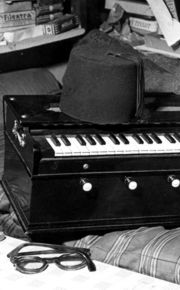Gurdjieff International Review
He Was a Root Man
Willem Nyland
The following text is taken from a transcript of a recording of Mr. Nyland speaking to his group on Saturday, October 3, 1970.
How can a man grow up? How can he really understand himself? What is needed for self-knowledge?

I say many times now—an ‘unflagging desire.’
You see, it is so right that when you read All and Everything that you start to compare what have we been talking about at meetings, and what is in All and Everything that confirms that. Or to say it the other way around, what is in All and Everything which can perhaps be elucidated by means of certain discussions we have had, so that it is proven to you more and more. And this is what I really wish—that you understand that what we have tried to say and talked about and defined, and examples given in some way or other, or elucidations and perspectives, that they are based on All and Everything and on nothing else but what Gurdjieff has said.
It was so good what P. read the other night, “From The Author,” statements which you now can understand, and you can understand them in the light of what we have talked about before, including ‘impartiality,’ including the word ‘exact-observation.’ Things of that kind here and there spread all over the book in All and Everything, if you could extract it at certain times and then derive confirmation for your Work, so that Work becomes clearer and clearer to you, that it gets away from any kind of a personal interpretation, surely on my part, but that then you will be able to read All and Everything as Gurdjieff wrote it and meant it, without going too much in detail, and of course using you might say, ‘root’ language.
That was Gurdjieff. He was a root man. That is why it is important to understand the meaning of scripture...
I would like to play Gurdjieff’s music played by Gurdjieff. You remember the little harmonium which was a companion of him for several years on several trips to America? Originally there were three. One, I think, fell by the wayside. Another one happened to stay, I believe, in France but I’m not quite sure. The third was given to a person here in New York who before she died, gave it to me. It is that little harmonium, P. is repairing it.
And now you will hear Gurdjieff playing ‘root’ music. Simple, one hand, sometimes a couple of fingers, sometimes only one finger; the other hand furnishing the power with the bellows, and it goes up and down and there is a little melody and there is a repetition. And it is Gurdjieff.
I wished there was a photograph of Gurdjieff playing that little instrument. I don’t think it was ever taken. I doubt very much if he would have allowed it. There is a picture in my mind, of course, and I see him. And I see him very clearly. I can see him and I hear him play. And I can see his movements and admire his fingers. And his left hand, how strong it was to keep on pumping the air so that noise would come out, tones would come out, life would come out.
And he, sitting, and every once in a while looking at you, maybe with such an expression on his face, not knowing exactly what he meant, sometimes perhaps pity, sometimes benevolence, sometimes hope, sometimes je ne sais pas quoi, if you understand that term. Impossible to describe. But he was that, I say ‘root,’ the quintessence of essence. And that is in that music, and that is really, I would say, all one needs to use as the basis for the embroidery of one’s life...
And so I think it’s all set up, isn’t it?
[A recording of Gurdjieff playing the harmonium followed.]
~ • ~
Willem Nyland first met Gurdjieff in 1924, in New York, and subsequently kept in contact with him until Gurdjieff’s death in 1949. Initially, he worked closely with A. R. Orage, but later, in France, Gurdjieff asked Mr. Nyland to start a group in America for which he would receive special material each week. After Gurdjieff died, Mr. Nyland was one of the founders and trustees of the Gurdjieff Foundation, where he remained active until forming his own independent groups in the early 1960s. Willem Nyland directed his students to read All and Everything three times as indicated by Gurdjieff, and then to keep on reading and studying it. His own detailed talks on Work were recorded as part of an oral tradition and are presently archived and used by his groups. While this material was not intended for general distribution, the above excerpt is offered by his groups as an indication of his approach to Gurdjieff’s ideas.
| Copyright © 2012 Gurdjieff Electronic Publishing Featured: Spring 2012 Issue, Vol. XI (1) Revision: May 28, 2012 |